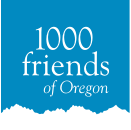A big win for Oregon
Whether you're a member, responded to our action alerts, planted one of our yard signs in front of your home, sent in testimony, or showed up in person for one of the many City Council meetings, you just helped Portland (and the rest of Oregon) make housing history.
After four long years, the Residential Infill Project (RIP) passed 3-1 at today’s Portland City Council meeting. Although it was originally expected to pass back when it was introduced in 2016, the extra wait made it even stronger than we could have hoped for. Each time it went before the public to weigh in on, it went back to City Council more remarkable than before.
1000 Friends’ housing advocacy is far from finished. Oregon is still short 155,000 homes, primarily for middle- and low-income Oregonians. Gentle infill from policies like HB 2001 and RIP will help solve the shortage, but there’s much more to be done.
1000 Friends: housing advocates since 1974
Many don’t know, but 1000 Friends has been fighting the housing fight since our founding in 1974.
Oregon’s land use program was established in 1973 with the passage of SB 100. Among other things, SB 100 required the adoption of statewide land use planning goals. Currently, there are 19. Goal 10 is the Housing Goal: It has been an integral part of the land use planning system — and the work of 1000 Friends of Oregon — since our formation.
The early impact of Goal 10 was remarkable: within 10 years, the residential capacity of the Portland metropolitan area more than doubled — without adding an acre of land. But, the zoning and housing options available haven’t kept pace with demand and growth.
In keeping with our original plan and in alignment with Oregon’s 19 land use goals, we’ve decided to sunset Portland for Everyone as a program name, but not as an idea. Our work at 1000 Friends on housing, climate and transportation is, has been, and will continue to be focused on Oregon's 241 towns and cities.
For today, making it possible for Portland to successfully accommodate its growing population will help ease housing pressures throughout the rest of Oregon.
Community Support Matters
RIP wouldn't have been possible without the support of Portlanders, environmental & community groups and foundations, to name a few. We'd like to thank some of our partners and driving forces behind getting RIP passed:
- Portland Bureau of Planning & Sustainability
- Portland City Council
- AARP Oregon
- Meyer Memorial Trust
- The Jackson Foundation
- Madeline Kovacs
- Michael Anderson
- Sightline Institute
- Portland: Neighbors Welcome
- Anti-Displacement PDX
- Sunrise PDX
- Living Cully
- Hacienda CDC
Portland for Everyone Coalition Members:
- Northwest Pilot Project
- St. Johns Opportunity
- Housing Oregon
- Northwest Housing Alternatives
- Common Ground OR-WA
- Mt. Scott-Arleta
- Propel Studio
- Division Midway Alliance
- Northeast Coalition of Neighborhoods
- Green Lents
- Woodlawn Neighborhood Association
- Portland Community Reinvestment Initiatives
- IBEW 48
- Ethos Development
- The Street Trust
- Sunnyside Neighborhood Association
- Safe Routes to School - Pacific Northwest
- Depave
- Rose Community Development
- Sabin Community Association
- Proud Ground
- Cully Association of Neighbors
- Portlanders for Parking Reform
- Portland Housing Center
- Oregon Walks
- Guerilla Development Co.
- Housing Land Advocates
- King Neighborhood Association
- Living Room Realty
- Turtle Island Development LLC
- Onward Oregon
- Urban Development Partners
- Green Hammer
- Communitecture
- Environs
- The City Repair Project
- Home Builders Association of Metropolitan Portland
- Bike Walk Vote
- Studio Petretti Architecture
